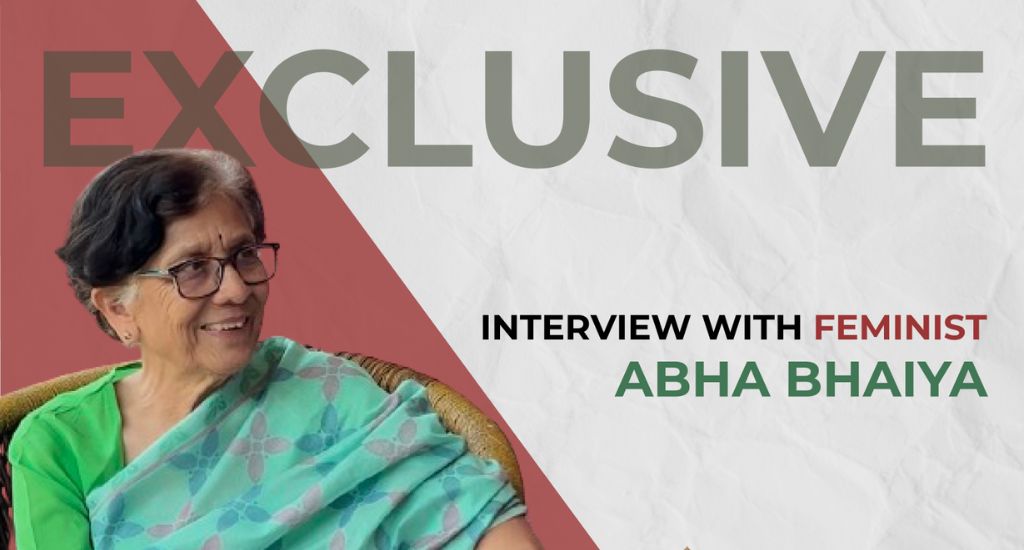‘A woman’s life is similar to that of the land’
Pallavi Srivastava
Jul 11, 2024
Dharmshala, Himachal Pradesh
A woman’s existence has been poisoned by violence, just like land has been destroyed by chemical use, says social activist Abha Bhaiya. She tells us how at Jagori Rural, an NGO located in Himachal Pradesh, they try to heal both.
When a soft voice, dainty frame and mellow demeanour meet an iron will, clear vision and strong drive, we get Abha Bhaiya. One of the most well-known feminist activists in the country, Bhaiya has been steadfastly carrying on the work she began about 50 years ago – to fight gender injustice in all its forms.
“For me, feminism is about challenging all systems of domination,” she said. “Gender doesn’t work in isolation. For instance, a Dalit, landless, single woman is powerless at so many levels,” added Abha Bhaiya, the executive director of Jagori Rural Charitable Trust, a non-governmental organisation located in Rakkar, a village near Dharamsala in Himachal Pradesh.
Jagori, which started in 2003 as a community-based programme with 10 girls from a very marginalised community, is now working in about 350 villages.
“We first started asking the girls to go back to school and also join feminist activism. Most of them went on to pursue their masters,” recalled Bhaiya.
Jagori now runs several empowerment programmes in rural areas, one of which involves 3,000 adolescent girls, and aims at creating young peer leaders to raise issues within the family and the community about violence against females, against land and lack of infrastructure, among other issues. The organisation also runs seven nari adalats (women’s courts), where local women who have literacy skills are equipped as nyaya sakhi (barefoot lawyers or friends of justice).
Also Read: Girls join football clubs to resist child marriages in rural Bihar
“They know the legal framework and can go to court on behalf of the aggrieved women,” explained Bhaiya.
Another important part of their work is conducting health camps where rural women and girls are educated about their body parts, how the reproductive system works, gynaecological issues and also about how to say no.
“The bruises of physical violence are not only on the body but also on the mind, so we talk to women about how to deal with that,” Bhaiya said. “And then we work with survivors, meeting them after the cases are resolved to check how they are doing. Our job is to first see someone’s wound, then apply balm on it and move on to other hurt persons.”
Though Jagori was born as a feminist organisation, it now also works to promote organic farming practices.
“The life of a woman is very similar to that of the land,” Bhaiya said. “Both have been poisoned, the former by violence and the latter by use of chemicals. We never show our gratitude to either of them. At Jagori, we think of how to detoxify and heal both.”
But women’s empowerment remains the issue at the core of their work since Bhaiya has been a part of the feminist movement since its first wave, setting up an organisation called Saheli in 1980 in Delhi. The birth of Jagori too happened in Delhi in 1984.
“Our concern was how do we work with women who have been denied literacy skills?,” recounted Bhaiya, talking about how they began with feminist music, taking folk songs and turning their lyrics into feminist messages related to gender inequality, discrimination, experience of violence and denial that women go through at so many levels.
“Kamla Bhasin (poet, author and social activist) wrote most of them,” said Bhaiya, adding that it was easy for women to sing those songs because they knew the tunes. “That was the starting point. We then began imparting literacy to them using slogans that they can do something to change their life.”
Abha Bhaiya firmly believes that feminists are born, not made. And she started affirming herself as a child being brought up in a Marwari family in Jaipur.
Also Read: Equality remains a distant dream for rural women
“I saw how my brother was treated differently from the sisters, and realised why he was conceived in the first place after three girls,” she said, reminiscing how she was exposed to social and political activism when she went to Germany at the age of 21 in 1968 for further studies. “I realised there that it’s not about an individual but rather it’s a systemic issue that women are oppressed all over the world,” she said.
When Jagori was formed, they didn’t mince words to call it a feminist organisation. “We got a lot of jibes for it but we said we aren’t against men. We are against patriarchy, and that men can be feminist,” emphasised Abha Bhaiya, adding that now they have some fine young men eager to join Jagori in its work.
She wants to see work begin right within the home. “I once remarked at a gathering that girls will be safe if men don’t venture out of their homes after 7pm. Our families need to be democratic first,” she said. She is happy with the way girls today are taking decisions and setting goals for themselves.
“This won’t stop,” said Bhaiya. “It’s a deluge.”
Also Read: ‘Feminist sensitisation is needed for everyone’
Pallavi Srivastava is Associate Director – Content at Village Square.






